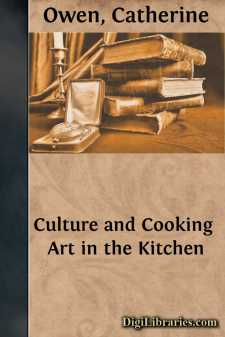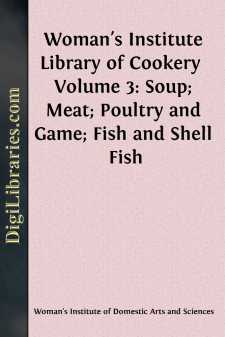Cooking
- General 70
- History 1
- Reference 10
- Regional & Ethnic 3
- Vegetarian 10
Cooking Books
Sort by:
by:
Eliza Leslie
SOUPS. GENERAL REMARKS. Always use soft water for making soup, and be careful to proportion the quantity of water to that of the meat. Somewhat less than a quart of water to a pound of meat, is a good rule for common soups. Rich soups, intended for company, may have a still smaller allowance of water. Soup should always be made entirely of fresh meat that has not been previously cooked. An exception to...
more...
MEATS AND POULTRY. To Boil Fresh Meat. In boiling fresh meat, care is necessary to have the water boiling all the time it is in the pot; if the pot is not well scummed, the appearance of the meat will be spoiled. Mutton and beef are preferred, by some, a little rare; but pork and veal should always be well done. A round of beef that is stuffed, will take more than three hours to boil, and if not...
more...
SAVE WHEAT Reasons Why Our Government Asks Us to Save Wheat, with Practical Recipes for the Use of Other Grains A slice of bread seems an unimportant thing. Yet one good-sized slice of bread weighs an ounce. It contains almost three-fourths of an ounce of flour. If every one of the country's 20,000,000 homes wastes on the average only one such slice of bread a day, the country is throwing away...
more...
by:
Mary Swartz Rose
CHAPTER I THE MILK PITCHER IN THE HOME (Reprinted from The Farmer's Wife, by permission of the Webb Publishing Company.) There is a quaint old fairy tale of a friendly pitcher that came and took up its abode in the home of an aged couple, supplying them from its magic depths with food and drink and many other comforts. Of this tale one is reminded in considering the place of the milk pitcher in...
more...
by:
Alice Bradley
INTRODUCTION Meals of many courses are neither practical nor popular with the modern hostess. For a company luncheon or supper it is not necessary to serve more than a hot dish, a salad, a biscuit or sandwich, a dessert and a beverage. A first course and a relish may be provided if desired. SUNDAY NIGHT SUPPERS The following menus were arranged especially as Sunday night suppers, but they are equally...
more...
by:
Carrie V. Shuman
TEA Tastes differ as to which of the many kinds of tea is the best, and yet the general use of English Breakfast and Oolong warrants the recommending of these two teas as standard. The Chinese have taught us the correct idea of tea drinking; to have it always freshly made, with the water boiling, and to steep the leaves at table. The tea table can be easily equipped now with a boiler in silver or...
more...
by:
Catherine Owen
a few preliminary remarks Alexandre Dumas, père, after writing five hundred novels, says, "I wish to close my literary career with a book on cooking." And in the hundred pages or so of preface—or perhaps overture would be the better word, since in it a group of literary men, while contributing recondite recipes, flourish trumpets in every key—to his huge volume he says, "I wish to be...
more...
SOUPS. Bouillon Soup. 4 pounds of round of beef cut into dice pieces. Trim off all fatty skin. 4 quarts water; 1 teaspoonful celery seed; 4 large onions; 6 large carrots; bunch of parsley; 6 blades of mace; 16 whole cloves, salt and pepper to taste. Pour on the water, and let it simmer six hours, skimming carefully, for if any grease is allowed to go back into the soup it is impossible to make it...
more...
VALUE OF SOUP 1. SOUP is a liquid food that is prepared by boiling meat or vegetables, or both, in water and then seasoning and sometimes thickening the liquid that is produced. It is usually served as the first course of a dinner, but it is often included in a light meal, such as luncheon. While some persons regard the making of soup as difficult, nothing is easier when one knows just what is required...
more...
THE PROBLEM OF FOOD 1. Without doubt, the greatest problem confronting the human race is that of food. In order to exist, every person must eat; but eating simply to keep life in the body is not enough. Aside from this, the body must be supplied with an ample amount of energy to carry on each day's work, as well as with the material needed for its growth, repair, and working power. To meet these...
more...











